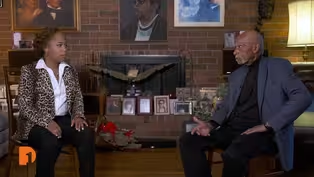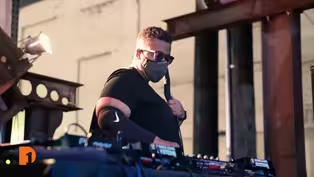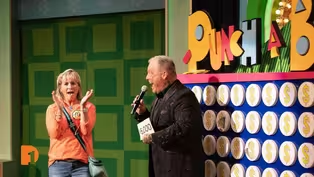
The history, influence of African American religious music
Clip: Season 9 Episode 32 | 7m 47sVideo has Closed Captions
Religious leaders from Detroit explore the history and influence of Black religious music.
One Detroit contributor Stephen Henderson talks with Rev. Larry Simmons of Baber Memorial AME Church and Dr. Brandon Waddles, the assistant professor of choral conducting and music education at Wayne State University, about the history and ability of African American religious music to evoke emotions, connect cultures and serve as a universal language.
Problems playing video? | Closed Captioning Feedback
Problems playing video? | Closed Captioning Feedback
One Detroit is a local public television program presented by Detroit PBS

The history, influence of African American religious music
Clip: Season 9 Episode 32 | 7m 47sVideo has Closed Captions
One Detroit contributor Stephen Henderson talks with Rev. Larry Simmons of Baber Memorial AME Church and Dr. Brandon Waddles, the assistant professor of choral conducting and music education at Wayne State University, about the history and ability of African American religious music to evoke emotions, connect cultures and serve as a universal language.
Problems playing video? | Closed Captioning Feedback
How to Watch One Detroit
One Detroit is available to stream on pbs.org and the free PBS App, available on iPhone, Apple TV, Android TV, Android smartphones, Amazon Fire TV, Amazon Fire Tablet, Roku, Samsung Smart TV, and Vizio.
Providing Support for PBS.org
Learn Moreabout PBS online sponsorship(upbeat music) - One of my favorite jazz tunes is "Work Song," and my favorite version of that is the one recorded by Cannonball Adderley.
I listen to it all the time, and of course, it's jazz.
It's a jazz standard in many ways, but I don't know that everybody knows the history of that song, that it is a call to work songs, which were the way that enslaved Africans in this country made the burden of slavery just a little more bearable, right?
By singing, coming up with songs to pass the time, and survive the brutality of slavery.
And I tell that story to say that so much of our music today comes from that experience.
And of course, jazz is one form of that, but gospel is another.
And of course they are also tied together.
All of this is along this continuum that has its roots in our history.
So I think when we talk about gospel and the power of gospel in the Black church, we have to start with the power of song in the period where we were enslaved.
Brandon Waddles, did I get that history right?
- You have it absolutely correct.
How wonderful.
I've had the pleasure of serving as a music director for Legacy for the past five years, and she has been attributing the great Nina Simone who before has said has a very definitive setting of that same work song.
And it's so interesting, so powerful to realize that these songs that were birthed out of hard times have now become our uplift.
And it's just a testament to, I just think that the great potential within our community, the great fight that we have within us, that is not only within the negro spirituals of that time, but of African music that inspired it before, before we were even brought over here against our wishes.
And that translates into all of Black American music, that translates most to all of American music today.
And certainly gospel and jazz are no different from that.
So wonderful.
Thank you, historian.
- Yeah.
Reverend Simmons, talk about in your church and other Black churches, the role that this music plays now and how it connects to that history I was talking about.
- Let me say that music is fundamental to faith.
I'm not gonna take you all the way into the deep end of this, but you gotta know that the Bible actually says that the sound of God is like a trumpet.
This sense of music is intrinsic when in the Bible, in the Old Testament, when the Jewish nation was being divided, God created a special group of people called Levites, sons of Levi, one of whose primary functions was to bring music to worship.
The Bible's replete with stories of music being used by God to usher in the Holy Spirit before people would begin to prophesy.
If you go all the way to the end of Revelation, in the very first chapter, it says that the sound of God, the voice of God was like mighty waters, like the sound of a trumpet is what John says he heard.
Just understand that we are bringing forward a move of God which is as old as creation because the Bible says that God spoke and created the earth.
And it is intrinsic to us.
And I'm gonna tell you, I can't prove this Dr. Waddles would be able to speak to this far better than me, but there's something about African-Americans, really the African diaspora, there's something about us that the music we create, that music reverberates through every culture on the planet.
- Dr. Waddles, talk about how that influence I guess moves from Africa to enslavement here and then into the church through gospel and also of course meter and tempo and things that we see from Black preachers.
It becomes more than just, as Reverend Simmons is talking about, more than just a part of what we experience, it is what we experience.
- This story of translating music and African culture, the diaspora into the United States begins with our journey over here.
And to know that music was the universal language that helped us to communicate when we were speaking Igbo and Yoruba, we had so many different dialects and languages.
You have to realize that when we got over here, many of us did not know each other but to be able to communicate through the music.
And then when you had many of these missionaries who were coming down south to use Christianity, mind you as another enslaving mechanism, mind you that one scripture, slaves be good to your masters.
Well they made a mistake and also told us about Joshua fighting a bit in the Battle of Jericho and Daniel getting out of the lion's den.
And I tell them they really made a mistake when they talked about Jesus being crucified and dying but rising up in three days.
That was to us our story.
So we created music from those stories and we also used some of what we all called the old Watts tunes.
Isaac Watts, one of the great hymn writers of the day.
And so we formulated that with syncopation and polyrhythm.
We'd already had that, probably besides that, the most other most important aspect of that is that of the grio, the storyteller who is important to all the folk tradition.
But specifically in African diaspora, the grio is the community lead.
That means the grillo is the lead singer, it's the worship, they're the pastor.
So the grio finds their way in people like Reverend Simmons.
They find their way in figures like, oh my goodness, Steve, the father of African Methodism, and how we come to find Richard Allen, of course, how we come to find our own independent Black denomination sometime before we are actually freed from slavery.
African American opera tenor, trailblazer George Shirley
Video has Closed Captions
Clip: S9 Ep32 | 6m 51s | African American opera tenor George Shirley reflects on his trailblazing music career. (6m 51s)
Detroit DJ Whodat talks house music, Black women artistry
Video has Closed Captions
Clip: S9 Ep32 | 5m 28s | Detroit DJ Whodat talks about being an African American woman in the music industry. (5m 28s)
Things to do around Detroit this weekend: February 7, 2025
Video has Closed Captions
Clip: S9 Ep32 | 1m 58s | Black History Month events, upcoming performances and more happening this weekend. (1m 58s)
Providing Support for PBS.org
Learn Moreabout PBS online sponsorship
- News and Public Affairs

Top journalists deliver compelling original analysis of the hour's headlines.

- News and Public Affairs

FRONTLINE is investigative journalism that questions, explains and changes our world.












Support for PBS provided by:
One Detroit is a local public television program presented by Detroit PBS


